It wasn't without its drama, but we pulled our second show off this weekend. It was a wonderful time. It began with Cathie walking in the door and handing me a sandwich baggy full of coupons, despite the fact that the vein in my forehead indicated that 10 minutes before the start of the show was not the best time to try to convince me to save money on curbing this summer.
We had a great turnout for the show. There was even a June Snapple supporter in attendance.
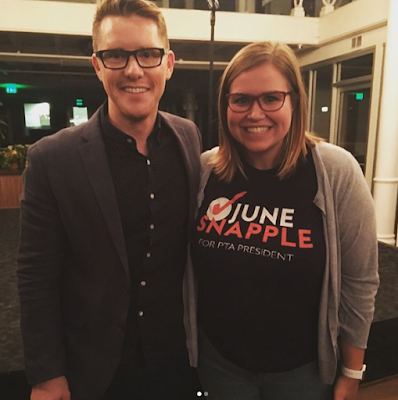
So that was awesome.
If you were unable to make it this time, we hope you'll come next time. Because we missed you.
Below, please enjoy the recording from our show and some pictures. I have also included the text of the story I shared for the hearing impaired. And for those who just generally hate the sound of my voice. (Jolyn).
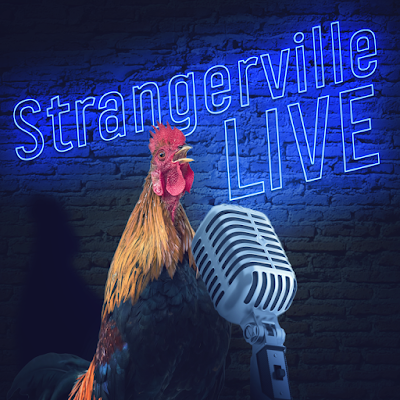
This time in Strangerville, four storytellers take the stage at our second live show. A mother of four takes a dramatic journey to complete her family. A woman falls in love twice. A boy wreaks havoc on his neighborhood. And a six-year-old lands in hot water on the playground.
Production by, Eli McCann, Jolyn Metro, and Meg Walter
1. Somebody Catch the Baby by Rachelle Young Pearson (starts at 5:55)
2. Love Letter by Sara Staheli Hanks (starts at 23:55)
3. Trundle Bed by Craig Hanks (starts at 42:30)
4. Simon Peabody by Eli McCann (starts at 58:52)
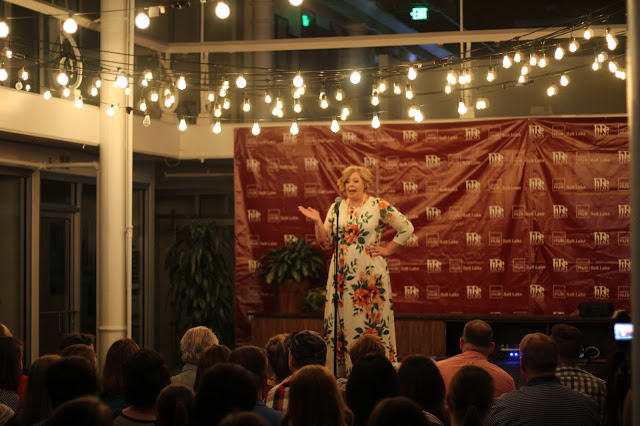 |
| Rachelle |
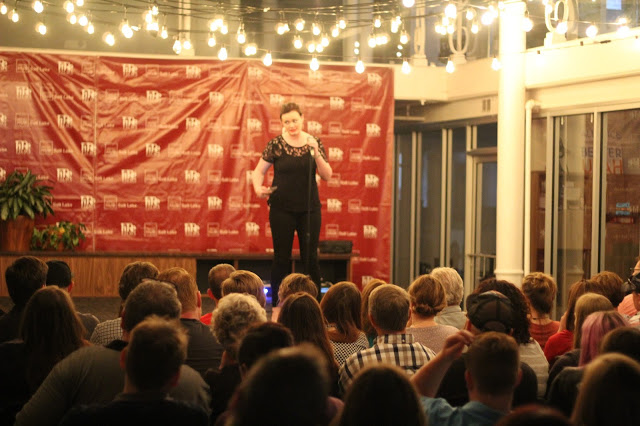 |
| Jolyn |
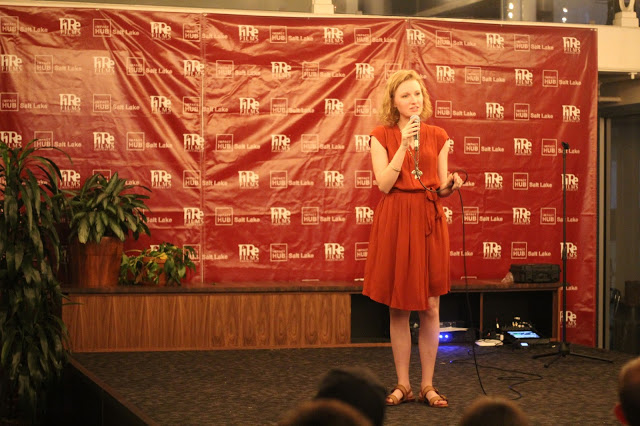 |
| Sara |
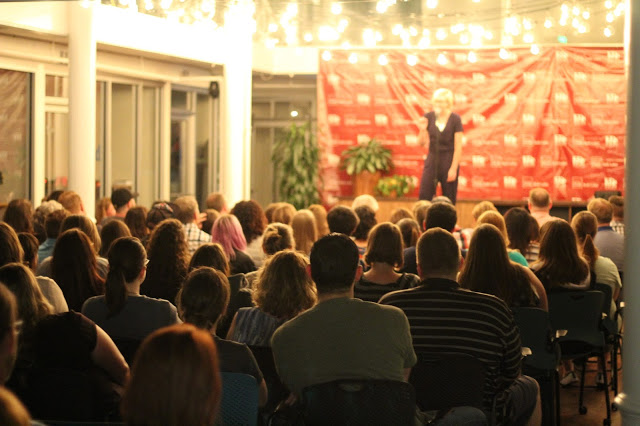 |
| Meg |
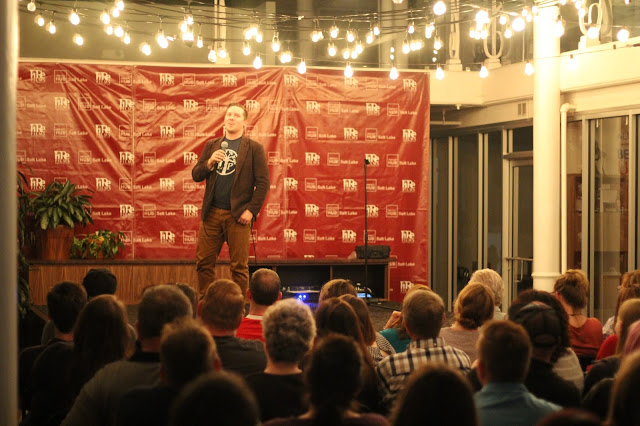 |
| Craig |
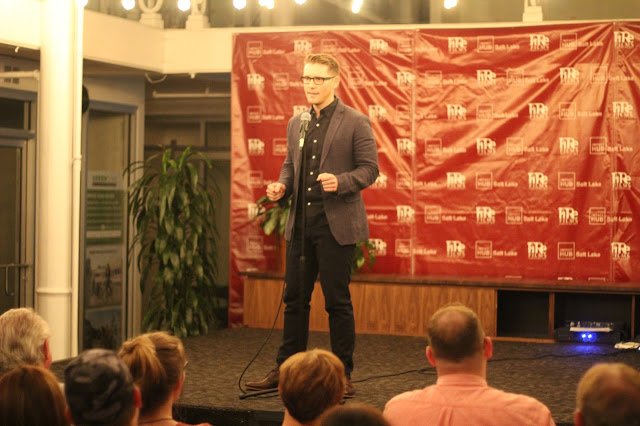 |
| Pure Beauty |

I stood on a platform at the church pulpit, looking out over a couple hundred smiling Mormons. I needed the platform because I was only 4 feet tall. I was 6, and my mom stood next to me for my big moment. A time to truly shine. I had been planning this for weeks.
I was initially given the assignment by a grownup at church. They were planning a program about the Mormon pioneers, and I was tasked with memorizing one line that I would have to recite to the couple hundred smiling Mormons. The line: “Pioneer children walked all day and never complained.”
I told them I wouldn’t do it. My parents tried to persuade me otherwise, telling me how important this big event was. I adamantly declined. That’s when my mother made an offer I couldn’t refuse. She opined that I was scared to get up in front of all of those people by myself, and she told me that she would walk up there with me—the only mother to do this—and stand by my side during this performance.
This was offensive. I wasn’t afraid. I just hated church and doing things. But if my mother wanted a show this much, I was going to give her one. So I agreed. I would deliver that line, but only if she would accompany me onto the stage.
I then made a plan. A terrible, awful, pretty genius plan. And I practiced. I practiced the hell out of that line.
Everyone was going to know how much the pioneer children walked without complaining. No one was going to doubt those pioneer children.
And when the time arrived, I marched onto that stage with all the determination and professionalism I could muster, my mother proudly trailing behind me. I stood on that platform at the church pulpit, looking out over a couple hundred smiling Mormons, and I delivered my line: “Pioneer children walked all day and never complained.”
The congregation was pleased with my conformity. I saw it in their eyes. I had them captivated with my chipmunk voice and blue clip-on bow tie. And that’s when I executed the plan. The terrible, awful, pretty genius one.
My mother had turned to walk away. I saw her out of my periphery. And before she could stop me I grabbed the mic and pulled it to my mouth, like I was a drunk lounge singer, and I yelled, “and THAT ladies and gentlemen is the STUPIDEST thing I have ever done in my entire life!” And with two hundred pairs of eyes locked onto me, and with a collective gasp echoing through the room, I turned, and in front of everyone, I slapped my mother across the ass.
I was locked in a room for a long. Long. time after that day. My family has thereafter since referred to the event as “the butt-slapping incident” in hushed voices.
“Hitting” is apparently wrong. I was told this as my mother repeatedly spanked me with the smooth side of a hairbrush, her 1989 weapon of choice—one that the world’s most powerful militaries have yet to perfectly re-create. And then I was told that if I ever resorted to violence again, particularly in its most embarrassing form, I would be sentenced to the ultimate McCann family punishment. One that was only ever threatened but never actually utilized. A night locked in the chicken coop in the backyard, one which my parents were keeping because making our clothes, grinding our own wheat, and dressing like 1960s flower children was not enough for them.
A night in the chicken coop was not something I could risk. There was a satanic chicken out there—one that looking back was actually probably a rooster--but which my older sisters had not-so-lovingly named The Queen of Colors. This animal had attacked my oldest sister’s friend and its talons were caught in her hair for some time as the girl spun in circles, screaming so loudly that none of the chickens gave us any eggs for 2 weeks.
The point is, I was on my best behavior, determined with all of the determination a six-year-old can have, to never hit anyone again.
It was only a few months later that Hartland Elementary School decided to test this determination.
It was a crisp fall day. We were at recess. The well-adjusted children who got along with others were playing sports and hopscotch and whatever it is first graders did in 1990. I was alone, walking circles around the playground, talking to myself.
I was also talking to my imaginary enemy, Monty. I didn’t have an imaginary friend. Just an imaginary enemy. And Monty and I were frequently engaged in arguments about the importance of turning the faucet off while brushing your teeth or not over watering your lawn or turn off other faucets—we mostly fought about water preservation; I was for it.
And so, in the midst of a very fiery argument with Monty suddenly, a wretched child I didn’t know then and don’t know now approached me and started what he called “a kicking war.”
To this day, I don’t know why this happened. But this child, the wretched one, began aggressively kicking my shins through my home-made neon green MC Hammer pants.
I screamed at him to stop. In an effort to lure him into pacifism, I told him that I had Polio—a disease about which I knew nothing more than its name, and I only knew that because my sisters and I secretly watched episodes of Doogie Houser despite a strict family ban that also included such classics as The Simpsons, Married With Children, and I swear to you this is true, Carebears.
But the wretched child did not listen.
A crowd of six-year-olds had formed around us, giddily watching the live action happening somewhere near several lightly-swinging and now-abandoned tetherballs.
And that’s when, in my rage, I employed the only defense mechanism I knew: the helicopter.
For those unfamiliar, the helicopter is where you rapidly spin in a circle, arms outstretched, connecting anything within reach of your wingspan. It is deadly. And 100% effective. I’m not in a gang, but if I was, let’s just say the town would be cleared of any rival gangs pretty quickly.
And so, helicoptering with all the force I had in me, I felt my right fist connect with a very hard face.
I stopped, and looked, and saw that the face belonged to Simon Peabody.
You already perfectly pictured Simon Peabody when you heard the name Simon Peabody, but I’m going to describe him anyway: Simon Peabody was an unfortunate child. He was one foot taller than any other kid in the first grade, but he weighed half as much. He wore thick glasses that were twice the size of his face. He tucked in his shirts—a first-grade fashion faux pas that knew no match. And he was absolutely the worst person I could have punched. Because Simon Peabody was not the kind of pioneer kid who would have walked all day without complaining, if you know what I mean.
Simon Peabody was a tattletale. And I immediately knew that a siren was about to sound.
But before I could do damage control, the kicking from the wretched child commenced once again, prompting yet another deployment of the helicopter.
My fist connected with Simon Peabody’s face for a second time in 5 seconds. And this time it was worse. His glasses fell from his nose, caught, thankfully, by his Ninja Turtle adorned chums. Blood splashed from his nostrils like a running faucet that I would have totally turned off if I was brushing my teeth.
Every first grade child of Hartland Elementary School stood in shock until the recess aide swooped in, gathered Simon, and brought him into the school.
My teacher, Ms. Beckstead, was not a woman who would let this sort of thing slide. I knew this. I wasn’t sure what the repercussions might be for attempted murder of an unfortunate child named Simon, but I had been taught the rules of humanity at some point during my six years, including the one that says that you shouldn’t hit a man with glasses. But worse than facing Ms. Beckstead was the very real fear that my parents would be informed. Punching a child, even one named Simon Peabody, and causing a bloody nose was surely the type of infraction that mandated parental involvement by the school. This was not going to be handled in-house.
Considering my history, I was certain that I wouldn’t be believed no matter how dramatically I told my side of the story. A bloody attack on a classmate would be just the kind of thing all of the grownups would expect from the pulpit butt slapper.
The Queen of Colors was about to get a new roommate.
Unless . . . Unless I could escape Ms. Beckstead’s reach.
Although not the kind of person who would willingly let this sort of thing slide, I knew that Ms. Beckstead was currently distracted with her own affairs, and so there was a chance that if I hid long enough, she would forget the whole thing.
Ms. Beckstead’s recent falling-out with her boyfriend, who I swear to you was named “Harley,” could not have come at a better time for me. And I know what you’re thinking: How did 6-year-old Eli know so much about Ms. Beckstead’s dating life?
That is a totally appropriate question. And the answer to that question is that Ms. Beckstead showed up to class the prior Monday, sobbing, with mascara running down her face, telling us six-year-olds about Harley’s “secret family” (or maybe Ms. Beckstead was the secret family?). Then she gave us a lecture about what kind of man we should all be looking for one day.
And so, seeing a possible out, I knew that there was only one thing I could do: I had to go to the one place Ms. Beckstead could never catch me. The one room to which I had access that the likes of Ms. Beckstead could not penetrate.
I hid in the boys’ bathroom.
12 minutes later Ms. Beckstead’s long fingernail poked through the gap at the door of my bathroom stall, picking the lock, as I held as still as possible, like I thought she was one of those Jurassic Park T-rexes that can only see you if you’re moving.
I have no other memory of that day. I suppose the memories have been blocked. All I know is that I made it home, believing that there was a chance my parents would not find out about my troubles at school.
Then I arrived at school the next morning.
Not 10 minutes after the bell rang, a woman’s voice came through the intercom system, asking Ms. Beckstead to please send Eli McCann to the principal’s office immediately.
The long “oooooooooo” sound from the children in the class was still ringing in my ears as I exited the room and began my very long journey down a very long hall.
When I arrived at Principal Anderson’s office, Simon Peabody was already seated. I was asked to take the seat next to him. Seeing the fear on my face, Principal Anderson informed me, “I don’t bite.” This later turned out to be a question for the courts when he was convicted of several counts of child molestation just two years after this, but that’s really not the point of this story.
The point of this story is that, as Simon Peabody recounted my attack on him, I knew that I needed to outline the kick attack that preceded the helicopter move so my self-defense defense would be plausible.
But there was only one problem: I did not know the name of the wretched child. And when I finished the story and Principal Anderson asked me to disclose this name, I knew that I needed to identify someone for the sake of credibility, and so I did.I blurted out the first name that came to mind: “Davey Brown!”
Davey Brown had not kicked me. Davey Brown was my best friend. He had had nothing to do with this incident.
But in my six-year-old naivety, I believed that once the name was spoken, Principal Anderson would drop the entire investigation and we would all go back to our normal lives.
That is not what happened. Principal Anderson dismissed Simon and had Davey Brown summoned to his office. Davey Brown already knew the reason he had been called there by the time he entered the room, as was evident by his sobbing screams of “I DIDN’T DO IT.”
Principal Anderson turned to me and asked whether I was sure about my accusation. Annoyed that Davey didn’t just take the fall, I muttered, “nope.”
Davey was dismissed as Principal Anderson pressed for another name. The correct name.Josh Brady was up next. My other close friend. I was prepared to rat out every child in the class until someone falsely confessed.
A few moments later, Josh slowly walked into the office, eyes wide, and mouth shut. Principal Anderson had him sit down while he asked him whether or not he had kicked me the day before. I stared at Josh, looking upset with him, hoping that this would somehow help convince the principal that what I had said was true.
And to my shock, Josh confessed. He said it was him. He said that sometimes he feels so many feelings inside and it makes him behave in bad ways. Principal Anderson gave Josh a long lecture and demanded that he apologize to me. Me. The victim. Even to the authority figures, I had become the victim.
Josh apologized. I gallantly accepted this apology, telling him that sometimes kids make mistakes and I would forgive him this time.
I wondered why Josh decided to take the blame for something that he did not do. Josh had not kicked me. I knew this. That other wretched child had kicked me.
Josh had nothing to do with this incident. I couldn’t think of what could make someone so selfless to get thrown to the wolves by a liar, and then take the fall for that liar. Thanks to Josh Brady, my parents would never find out about this incident. Well, until tonight.
To be honest, this noble act of charity immediately began to soften my heart. Right then I realized that this was truly my best friend. Not that jackass Davey Brown.
I don’t know if any of you are lucky enough to remember the exact moment you realized that someone was your best friend. The exact moment when the person you would do anything for to this day won your loyalty.
That’s what this moment felt like to me.
I loved Josh in that moment and realized that he and I would be best friends for the rest of our lives. And I vowed to come through for him one day like he had for me that day.
As we walked out of the principal’s office, I turned to thank Josh for doing what he did. Before I could say a word, Josh offered, “I really am sorry I kicked you. I’m not usually like that.”
It immediately occurred to me that somehow, during the course of this conversation with the principal, Josh wrongly came to believe that he was guilty as charged.
This wasn’t a good friend.
This friend was super dumb.
And after that year, I never saw him again.
There’s a post script: In preparation for this story, I fished out my old class photo from 1991. I saw Simon Peabody with his thick glasses. My best friend, Davey Brown. Josh Brady. Ms. Beckstead. But then one thing caught my eye. It was Principal Anderson’s first name: one that I did not know until just two weeks ago: it was Harley.
I am sorely unsure of the basic rules of primary colors. I don’t know the names of any dinosaurs. I struggle with long division.
But I remember that Ms. Beckstead had a boyfriend named Harley.
~It Just Gets Stranger

